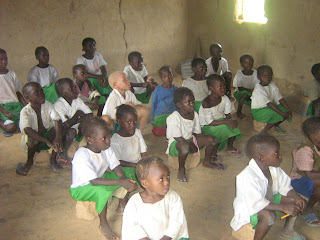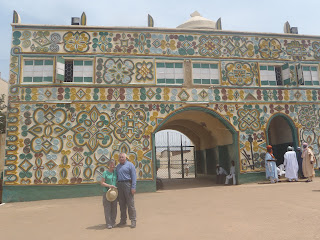I’ve realised that I haven’t really explained my role at Hope for the Village Child since I started this blog, so here goes...
 | ||||||
| Children at Ungwan Asiliko school are without desks |
First a bit on Hope for the Village Child (HVC from now on), it’s a rural development NGO that works with thirty rural communities southeast of Kaduna city, which has been operating for 15 years. They focus on poor rural communities who don’t have access to adequate health care, education or even water and sanitation, and helps them attain these basic necessities to improve their health and lives.
As the name suggests, the focus is on children, but HVC works with all members of a community to improve the lives of children. The office is split into different sections that each carry out different activities, these are health, education, women, secure livelihoods, rickets and children with disabilities. To give you a proper understanding of what each section does would take a while, but the HVC website gives a good summary with photos: www.hopeforthevillagechild.org
I’m not a specialist in any of the areas listed above, so how do I fit in?
 |
| The teacher uses the wall as there is no blackboard. |
My job title is ‘Capacity building advisor’ and the reason for my post is to support the organisational development (OD) process at HVC. I don’t have community development experience, but I have spent time working in offices, and big organisations, so I understand how they work. The OD process is a way of making the organisation more efficient, in its policies, systems and the skills of staff, so that they can do their work as effectively as possible. The idea behind VSO is the motto ‘Sharing Skills, Changing Lives’ so I’m sharing my knowledge and skills with HVC to help their organisation improve. It doesn’t make sense for me to give immunisations (if I could) or to teach school children, because there are Nigerians who are qualified to do those things, the idea of a capacity builder is to improve the skills of those who will stay in the country, leaving behind a sustainable change in the form of people.
Still following? Ok, so what does that really mean... ?
The OD process was begun the year before I arrived by another VSO volunteer who left in January. I’ve had to pick up from where he left off, which was a challenge in itself. Although he’d left all the documents I needed to work with, no one seemed to know which direction the OD process needed to take next, as there was no specific written plan for OD. We’ve now written a five year plan to guide the organisation forward, and I’m working with an OD committee who will be responsible for implementing the plan in the future.
As part of the OD process the last volunteer undertook an assessment of the capacities of the organisation. The staff identified areas they wanted to improve which were focused around involving communities in planning, monitoring and evaluation of programmes, as well as advocacy and their strategic plan, which doesn’t exist. They also carried out document and IT audits, which identified that HVC staff needed more IT training, and better documentation, including written policies for things like HR, finance etc.
Since I arrived in February I’ve been helping to develop an HR and financial policy, and before I arrived they had already completed child safeguarding, IT, and community expenses policies.
 |
| An activity from the PM&E workshop |
I also attended a training on participatory monitoring and evaluation (PM&E) from VSO with my counterpart from HVC. PM&E is a way of including all sections of a community to make sure you get as much input and involvement as possible from all the people who might benefit from a project or programme. This will in turn lead to better projects. E.g. If a community has identified that they need a well, then you should use a participatory process to plan the location, so that it is useful for all members of the community.
In August, I, my counterpart and another colleague ran a three day training for HVC staff in participatory M&E, and at our retreat in September the staff were able to practice these tools with one of the focal communities. This was my biggest achievement to date, and it felt like I was really sharing skills. Plans for the next few months include helping with the annual planning process, developing the planning templates, working with each section to plan their monitoring and evaluation for the year and doing some research into strategic planning.


















